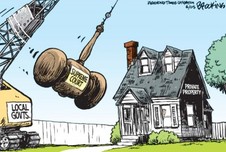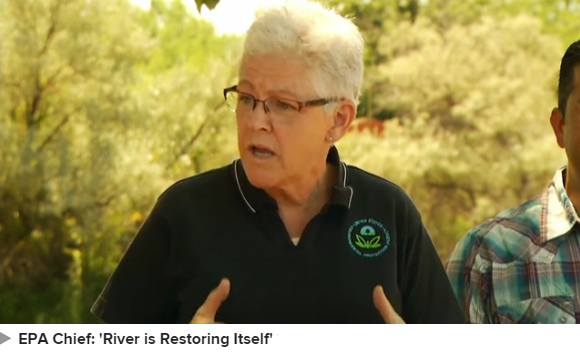WE are not always the first to cover a story. While some feel this anniversary is old news, it's worth revisiting. Here in Whatcom County eminent domain per se does not occur often. What's clearly underway is a slower, deeper, and more insidious form of public theft, but in another form -- uncompensated regulatory takings meant to whittle (and sometimes cruelly jerk) away the use of private land for any cause. Kelo still matters; the core lesson is the same. Cozy relationships exist between council, cities, planners, outsider enviro-control interests, and parasitic institutions like the Land Trust. These are working to systematically deal away rural and ag land use through new "planning tools" like mandatory TDR trades (transfers of development rights) to favor urban growth areas above other land use. As cities grow, rural areas will be made increasingly locked down and useless over time. Conniving developers who are involved: shame. WE will report more on that. But for now, know that

The News Talkers, June 23, 2015
Today is the tenth anniversary of the Supreme Court decision in the case of Suzette Kelo and the Fort Trumbull neighborhood. The Supreme Court of the United States found that the government has the right to take private property for the purpose of turning it over to private developers. A stunning admission by a state Supreme Court judge emphasizes the fact that this is one case which must be overturned.
A journalist, who wrote a book about the Kelo case gave a keynote address at a private dinner in 2011, in which he talked about Suzette Kelo’s personal story. In a most astounding statement, one of the state Supreme Court judges, Richard N. Palmer, approached Suzette Kelo and the journalist, Jeff Benedict, after the address, and said, “Had I known all of what you just told us, I would have voted differently.”
Suzette and the journalist were speechless because his vote would have changed history. The Justice “turned to Suzette, took her hand and offered a heartfelt apology. Tears trickled down her red cheeks. It was the first time in the 12-year saga that anyone had uttered the words ‘I’m sorry.’ It was all she could do to whisper the words: ‘Thank you.’”
Developers are almost always tied to a political party which makes this decision a political and unsavory one.
The case of Kelo v. New London on June 23, 2004 (Kelo v. New London 2004) was the deciding case.
The state decided to take Suzette Kelo’s beautiful waterview home, nicknamed The Little Pink House, and her neighbors’ homes, for use as a resort hotel and conference center, a park, and 80-100 new residence with office space.
 Gannett photo
Gannett photo This was an entire neighborhood they were willing to destroy, a long-privately-held community, and they did.
As it turned out, ten years later, it’s still an undeveloped, bulldozed area. All projects have fallen through. It cost the city $78 million to destroy the homes and prepare it for development.

Jeff Benedict, Hartford Courant journalist, has written a book about Suzette Kelo’s story called The Little Pink House.
It’s an American tragedy of stolen land that is playing out all over this country. It’s being abused in state after state, with New York the worst offender.
“They put in infrastructure and roads to nowhere, sidewalks to nowhere with always the thought that they were going to have this redevelopment plan where a hotel would come, a health club, cafes, restaurants and stuff like that that never came to be,” Kelo told The Daily Signal.
And for Kelo and Michael Cristofaro—who grew up in the Fort Trumbull neighborhood and whose father was one of the plaintiffs in the case—the wounds from their battle with New London haven’t yet healed.
“If you look out, this is what the city of New London wanted,” Cristofaro told The Daily Signal, standing in the Fort Trumbull neighborhood. “This is what they took our homes for—this vast amount of land. This is what the U.S. Supreme Court said that the city of New London was justified in taking our homes—an empty field. As far as I’m concerned, it’s an empty dream.”





 RSS Feed
RSS Feed
